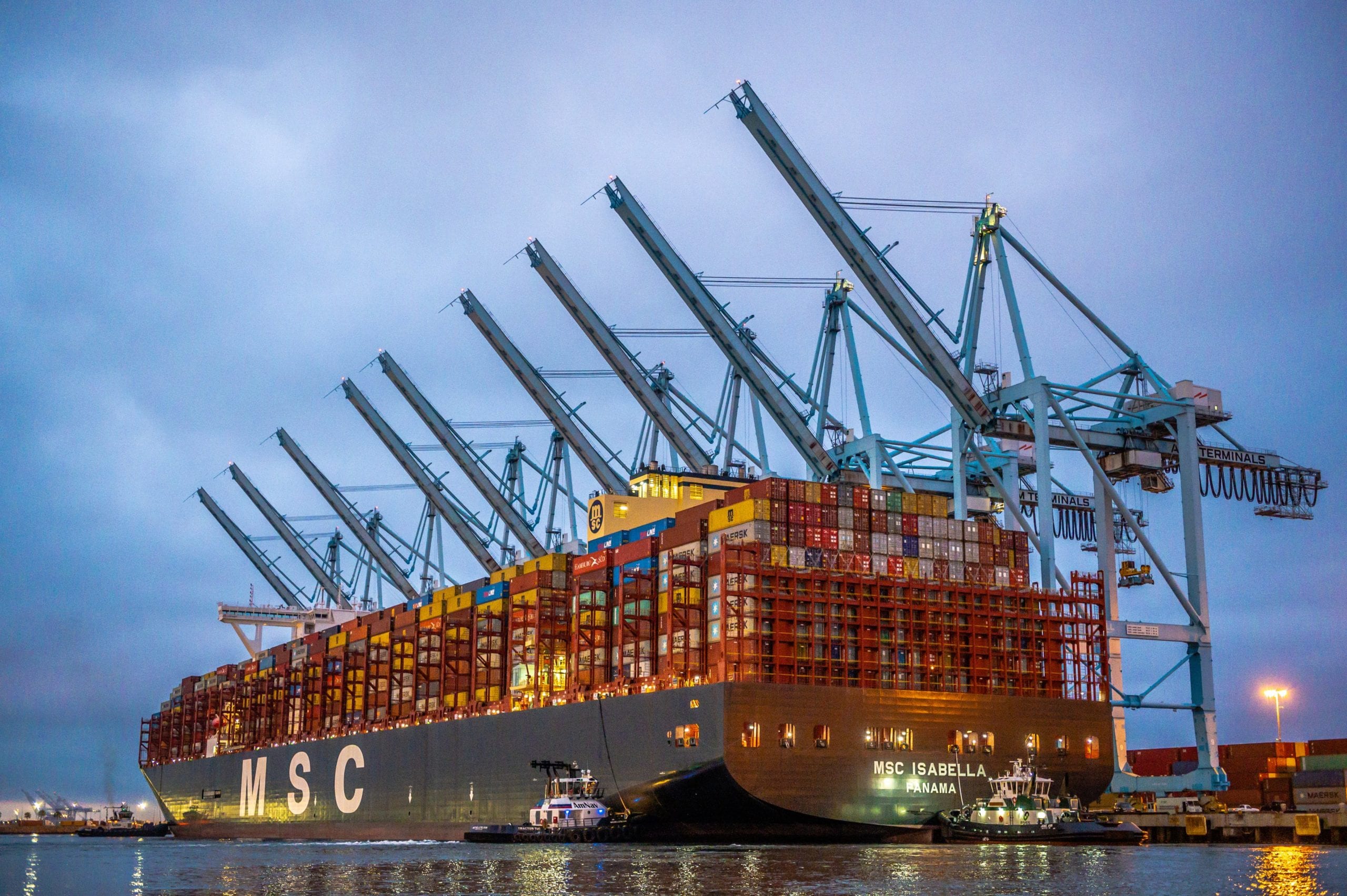MSC Isabella at the Port of Los Angeles. Photo courtesy Port of Los Angeles

WASHINGTON, Nov 2 (Reuters) – U.S. President Donald Trump’s “America First” trade policy torched a 70-year consensus on trade liberalization, drew a harder line against China’s state-driven economic model and erected new tariffs on imported steel and aluminum, alienating allies.
Trump is touting his efforts to protect American workers and a Phase 1 trade deal with China that promises to boost U.S. exports as closing arguments in Tuesday’s presidential election.
Economic data so far shows mixed results from that effort, with some sectors gaining at the expense of others, but with little change in the overall U.S. trade deficit for goods and services.
Since 2018, Trump has imposed punitive tariffs on imported washing machines, solar panels, steel, aluminum and goods from China and Europe, with Chinese imports accounting for most of the nearly $80 billion collected so far.

The tariff war against China started with a 2017 investigation into longstanding U.S. complaints about Chinese state-driven economic policies, including intellectual property theft, forced technology transfers and rampant subsidies to state-owned firms that were pushing the U.S. trade deficit higher.
Business interests largely supported the goals of the “Section 301” probe, but warned that tariffs would hurt U.S. competitiveness by raising input costs.
Retaliations and escalations eventually imposed tariffs on $370 billion in Chinese goods before the Phase 1 deal was signed in January, committing Beijing to boost purchases of U.S. farm and manufactured goods, energy and services by $200 billion over two years.
Thus far, the tariffs have reduced imports of goods from China but have not significantly altered the global U.S. goods and services trade deficit.

Companies responded by diversifying supply chains, shifting some production out of China – but mostly to other low-wage countries, such as Vietnam and Mexico, not to the United States.

One of Trump’s goals was to increase American manufacturing jobs. The numbers have grown since he took office in 2017, partly due to a massive corporate tax cut. But manufacturing employment growth slowed after he launched the tariffs in 2018, becoming a trickle before the coronavirus pandemic hit in early 2020.

The Federal Reserve’s measure of U.S. manufacturing output also peaked in 2018.

STEEL SLIDE
Trump angered U.S. allies in Europe, Asia and the Americas by imposing 25% tariffs on steel and 10% on aluminum in 2018 on national security grounds.
The tariffs prompted new investment in the sector and restarts of some idled mills, including U.S. Steel Corp’s Granite City Works in Illinois. But the hiring renaissance was short-lived as lower prices caused some closures, including one of two blast furnace at Granite City, where Trump heralded the industry’s renaissance in July 2018.

Steel industry executives have argued that without the tariff protections, domestic steelmakers would be in far worse shape because of a global production glut largely centered in China. The tariffs have cut the market share of imports, allowing domestic steelmakers to utilize more of their capacity.

“NO DISASTERS”
Backers of Trump’s trade strategy argue that it did not lead to the major dislocations predicted by industry and won bigger concessions from China than any previous U.S. president did.
It pushed U.S. companies to diversify away from China and move some critical supply chains to the United States, said Stephen Vaughn, former general counsel at the U.S. Trade Representative’s office.
“All the sorts of disasters that people on the other side predicted literally never happened,” said Vaughn, now a trade partner at the King and Spalding law firm. “Even if you assume that all of the tariffs were paid by consumers, an $80 billion tax increase was never going to tank a $22 trillion economy.”
While Trump’s Phase 1 trade deal is now starting to boost agricultural exports to China after a slow start amid the COVID-19 pandemic, it failed to address many of the issues that really matter to U.S. companies. These include China’s technology transfer policies, industrial subsidies and barriers to digital services access in China.
“There’s still a legitimate question about what all this pain was paying for,” said Nasim Fussell, who served until August as the Republican trade counsel on the U.S. Senate Finance Committee. “There will be pressure from stakeholders to work towards a Phase 2” to address more substantive issues, added Fussell, now a trade lawyer at Holland and Knight.
But China remains barely more than halfway to its first year purchase targets on the Phase 1 trade deal, particularly for manufactured goods during the COVID-19 pandemic, according to trade data calculations by Chad Bown, a senior fellow with the Peterson Institute for International Economics.
Economic factors such as commodity prices, Chinese tariffs, slack demand for air travel and a swine flu epidemic in China are weighing heavily on the export flows, Bown said.
“The dictum of ‘You need to buy more’ doesn’t necessarily seem to work.”
(Reporting by David Lawder; editing by Heather Timmons and Richard Chang)
(c) Copyright Thomson Reuters 2020.

 Join The Club
Join The Club











